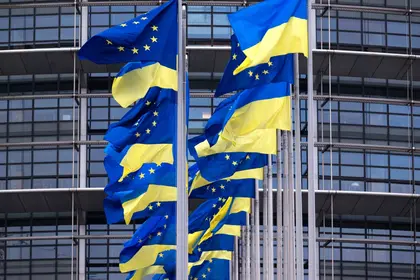Despite the challenges of war and operating under emergency conditions, Ukraine’s energy sector has made significant progress on the pathway to European integration. Nonetheless, there is still essential work to be accomplished.
On Nov. 8, 2023, Ukraine reached a crucial milestone in its European integration efforts. The European Commission issued a report affirming that Ukraine had successfully completed 90 percent of the benchmarks required to commence accession negotiations. The report highlighted significant improvements in the energy sector.
JOIN US ON TELEGRAM
Follow our coverage of the war on the @Kyivpost_official.
Additionally, the European Commission credited Ukraine’s economic recovery in 2023 to the resilience of its national energy sector. Despite enduring frequent Russian missile attacks, the stability of the energy sector played a pivotal role in supporting other businesses and helping them navigate the challenges of war.
The 2022-23 heating season was the most challenging in modern Ukrainian history. Ukrainians faced a situation unprecedented in any other country’s experience: deliberate and widespread attacks on its energy sector as part of the Kremlin’s strategy to suppress the country’s resistance.
But the Kremlin failed. The resilience of Ukraine’s national energy sector, combined with the professionalism—and often heroism—of Ukrainian energy workers, ensured the continuous functioning of the system and kept the “General Frost” at bay in Ukrainian homes.

‘Putin Should Make a Deal’ – Trump Discusses NATO and Ending Ukraine War, Russia’s Losses
It was a result of teamwork, with energy generation, transmission, and distribution companies working closely together. Naftogaz played its part by supplying natural gas to approximately 12.3 million households and most heat producers at a significantly lower price than the market rate.
Ukraine has entered heating season 2023-24 better prepared, with improved air defense kindly provided by our foreign partners and reinforced energy sites equipped with concrete shields and gabions.
Additionally, not only we have secured the energy needs of Ukrainians but also assisted our European partners in averting potential continental energy crises and keeping gas prices low. “Ukraine is playing a key role for central and eastern Europe’s security of gas supply this winter,” Financial Times quoted prominent energy expert Natasha Fielding.
However, the European Commission report primarily focuses on long-term energy resilience and sustainability rather than immediate survival concerns. Ukraine needs to further upgrade its energy sector to keep on integrating into EU energy markets, namely enhancing its approaches and principles. Essential conditions for this transformation include corporate governance reform at state-owned enterprises (SOEs) and the liberalization of the internal energy market.
In my initial days as Naftogaz CEO in November 2022, I requested the Cabinet to reconduct the election of the company’s Supervisory Board. On Jan. 24, 2023, a new board was sworn in, marking the end of a year and a half of direct governmental administration.
Naftogaz has been at the vanguard of corporate governance reform in Ukraine and continues to be its strongest advocate. Embracing the OECD Guiding Principles is key to improving the performance and efficiency of state-owned enterprises. This is especially critical for Ukraine’s post-war recovery, considering the substantial role played by specific state enterprises, such as Naftogaz, Energoatom, or GTSOU, in the economy and state energy security.
Another area in Ukraine that requires prompt reform efforts is the liberalization of energy markets. The EC report explicitly indicates that, in the near future, Ukraine is expected to progress in implementing cost-reflective energy pricing, gradually phasing out public service obligations (PSO), and replacing them with targeted support for vulnerable customers.
The existing Public Service Obligations (PSO), initially introduced as a seemingly reasonable but unprofitable measure during wartime conditions, unfortunately, impede both energy efficiency and the development of the energy sector. With rates set below the expenses needed for thermo-modernization, most households or heat producers lack the economic incentive to pursue smart energy consumption.
In the long run, the Public Service Obligation (PSO) fails to address the problem it was intended to solve—to make life easier for ordinary Ukrainians. It boils down to simple economics: when consumers pay a price lower than the market rate, someone else needs to bridge the gap. However, in the case of the state budget, there is no “someone else.”
The disparity between the market price and the PSO rates will eventually be shouldered by Ukrainians through taxes. When this cycle completes, we will find ourselves once again in a situation necessitating tariff increases and the implementation of energy-efficient policies. This inevitability will occur sooner or later.
The consequences of this delay will include a depleted state budget and the lost opportunity for energy companies to utilize time for post-war recovery and modernization due to financial constraints.
Certainly, it does not imply leaving vulnerable customers on the brink of survival. Instead, the PSO's one-size-fits-all approach should be substituted with targeted support, addressing energy poverty without overburdening businesses and the state treasury. We aim to pursue sustainable solutions that align with the interests of all stakeholders.
Transparent and competitive markets, free from manual regulation, pave the way for such solutions. A recent illustration of this approach can be seen in Naftogaz’s practices. Throughout the spring and summer, the company accumulated gas reserves for the winter of 2023-24 to navigate the heating season without imports.
We needed to escalate our gas production while also motivating private companies to continue their efforts. This task posed significant challenges, particularly due to the gas export ban under martial law. Understandably, private firms were more inclined to reduce pumping than to sell gas at non-market prices or bear additional storage costs.
Naftogaz announced its intention to purchase the entire annual output from private extraction sources. During intervals between heating seasons, we consistently engaged in stock trading, procuring gas at competitive market prices. This strategy proved profitable for both Naftogaz and private companies.
We acquired gas at a fair price comparable to EU market rates, all without incurring transportation expenses. Simultaneously, private companies received the desired funds without the need to transport gas abroad.
Consequently, nearly one billion cubic meters were pumped into storage, contributing to, and exceeding the 14.7 billion cubic meter heating season reserve target established by the Cabinet of Ministers.
While it might seem that wartime conditions are not conducive to reforms, the reality is quite the opposite. To succeed and recover, Ukraine must fully detach from its post-Soviet legacy and evolve into a modern European country.
In our case, internal modernization and European integration are fundamentally intertwined, forming integral components of the same process.
Arguably, this is the key takeaway from the recommendations outlined by the European Commission.
The views expressed in this opinion piece are the author’s and not necessarily of Kyiv Post.
You can also highlight the text and press Ctrl + Enter










